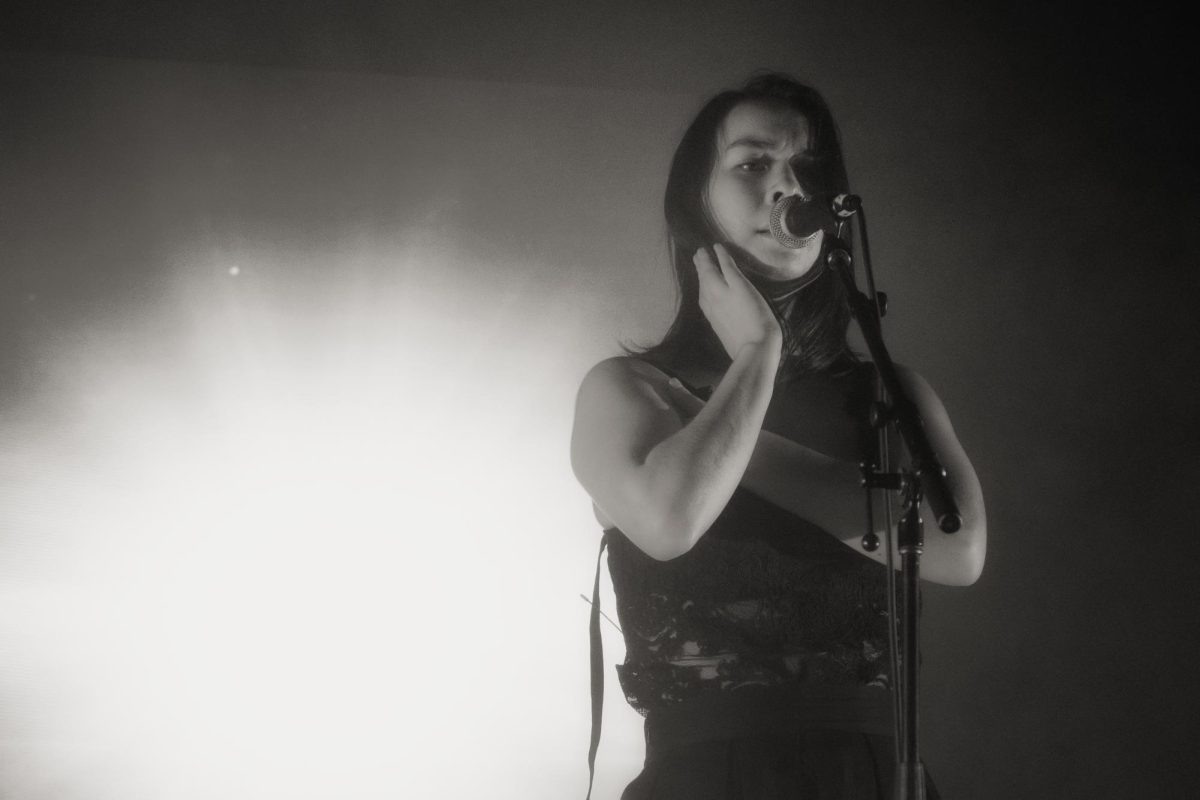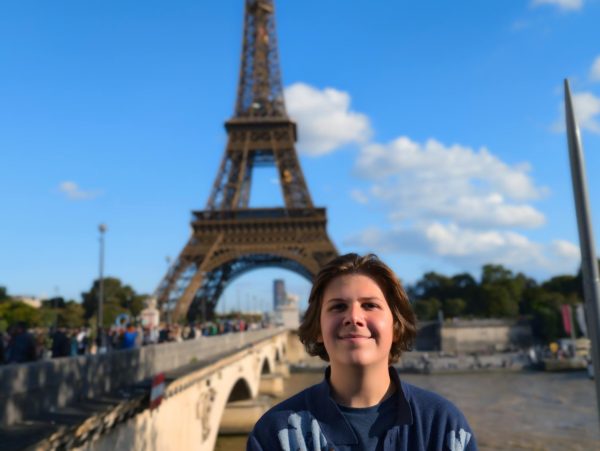On September 15, singer-songwriter Mitski Miyawaki, née Mitsuki Laycock, and known more commonly by her mononym Mitski, released her seventh album, The Land Is Inhospitable and So Are We.
Mitsuki Laycock was born in 1990 in Japan to foreign diplomat parents, bouncing between 13 countries before settling in the US. She studied at SUNY Purchase after transferring from Hunter College, pursuing music, and releasing her first two albums, Lush and Retired from Sad, New Career in Business.
After she graduated, Mitski continued to produce albums, many of which have become famous. Songs from Bury Me At Makeout Creek, Puberty 2, and Be the Cowboy were trending on social media platforms such as TikTok during the COVID-19 pandemic.
“The first song I listened to by Mitski was ‘Washing Machine Heart’” said long-time fan Lauren Leith ’24. “I enjoyed the way she conveyed emotion through music…Mitski’s voice is fairly unique which makes her music more enjoyable to listen to as you can hear the longing in her voice.”
In 2019, Mitski considered leaving the music industry. “I was uncomfortable with being in the public eye. So I decided to leave the industry for however long it would take for me to get my heart and soul back,” she told NPR. “But eventually, I kind of looked around and realized just how lucky I was to get to create the music I want to make and have my music reach other people,” she continued. Mitski then released her sixth album, Laurel Hell in 2020 before another three-year break until her latest album.
Mitski often mentions that The Land Is Inhospitable and So Are We is her most American album and it questions what it means to be American. “I think I’m trying to reconcile all my various identities with being American today. I feel like I’ve always been seeing my own identities through the eyes of other people who haven’t lived my identities. And I kind of think maybe that’s also very uniquely American,” she also told NPR.
The album’s title also plays into the recurring theme of America and the nature of a country founded by revolution. “The album can be considered “American” because our country adheres to the core value of the song— the inhospitable land. To love and appreciate America alongside its shortcomings requires effort— yet we are beckoned to do so,” said listener Cecilia Rosa ’25.
“Bug Like an Angel” is the first track on the album and was also one of the few songs Mitski previewed before the album’s release. In the first verse, she compares loneliness and alcoholism, saying that “a drink feels like family.” Throughout her career, Mitski constantly writes about her quest for eternal love and about bad past experiences she had. After the verse, she sings with a choir to emphasize the word “family.” Then, in the second verse, she talks about karma and unfulfilled promises that “break you right back.” Again, she returns to the chorus, echoing that line into the listener’s ears. By repeating this lyric with the choir, Mitski is saying that she’s not actually alone when she’s alone, other people are also going through similar troubles.
The final verse touches on religion, one of the lines being “the wrath of the devil / Was also given him by God,” meaning that her actions are justifiable because God, who is assumed to be a righteous figure, created both good and evil. This final line ties back to the previous verses, giving her false reasoning for her behavior and how she can’t seem to break away from her addiction. The two themes, religion and alcoholism, are both traditional American themes embedded in the country’s founding. Overall, this first track neatly foreshadows the solemn tone of the entire album.
“Buffalo Replaced” is the second track on the album, which while having a faster tempo, carries the same reckless vibe as “Bug Like an Angel”. “My favorite song off the album is definitely Buffalo Replaced,” said Kathleen Bishop ‘25, “The acoustic guitar driving the song in the background, something different from the more relaxing tempos of her previous songs.” The song portrays a free spirit running around in the American western wilderness, frolicking among the bugs, a key symbol Mitski uses throughout the album. She also draws parallels between the songs and the real world, how the “freight train stampedin’ through my backyard / it’ll run across the places like the new buffalo replaced.” She compares the recklessness of the narrator with that of the American Industrial Revolution carelessly wiping out the native buffalo population. At the end of the song, the final chorus is “Freight train horn howlin’ out mad and wild,” further highlighting the similarities between the buffalo and the train, and thus hinting that nature and industry have some commonalities.
The third track, “Heaven,” is distinguishable from other songs on the album due to its swing cadence. The melody sways back and forth, like a ballad, which develops the romantic theme of the song. While the overall mood is loving, the lyrics contrast the narrator, who is feuding with their partner who “curses” and “finds the string / to strike within me / that rings out a note.” Mitski points out that relationships, even though they seem indestructible, are very intricate and sensitive. Later on, the narrator is in despair in the wake of the breakup, sipping on “the rest of the coffee you left / a kiss left of you.” Coffee is somewhat bitter, signifying that the breakup was a mess and the parting partner left the narrator with a painful feeling. The final verse is the narrator reminiscing on the relationship, listening to the heaven, which symbolizes the end of life, to come. This ties into the end of the song, where an idyllic violin piece that mimics a fluttering butterfly departing. This song is more related to Mitski’s previous works than others, but it remains that the American country feels through the music.
“I Don’t Like My Mind” shakes things up from Heaven and has less of a romantic feel. The song behaves just like how the title sounds with a spiraling effect, each lyric repeats itself into the next. Similar to “Bug Like an Angel,” this song showcases the narrator’s destructive tendencies stemming from her inability to sit still, creating a loop.
“The Deal” is one of the most appreciable songs on the album. It provides an alternative perspective to the common “deal with the devil” scenario, except the narrator doesn’t want any gain and just wants to get rid of her soul. In the second verse, Mitski meets a bird on a walk, who mentions how she is “a cage without me / your pain is eased but you’ll never be free.” This is a call to her relationship with the public eye and her potential leave in 2019 because while she felt comforted by leaving, she wasn’t free to produce music. The whole message is amplified by the instrumentals. “In ‘The Deal’ specifically, I like her use of a softer intro before building up to a louder, more orchestral part of the song, before softening again,” said Leith.
“When Memories Snow” is the shortest song on the album, clocking in at only one minute and 44 seconds. It may be short, but Mitski continues to include many American themes in the song. The narrator is shoveling snow (memories) off her driveway so that she can move forward and go to the store. Like other songs, “When Memories Snow” has a heartbroken narrator who shrugs off progress and sits in ignorance. The second verse poses a question, “If I break / could I go on break?” This could be referring to Mitski’s hiatus where she felt pressured to create music until she broke, and only then she would be free. The instrumentals in the song only boost the sense of despair. “The percussion and orchestral feel to ‘When Memories Snow’ is my favorite element of the album as it creates a powerful feeling of longing and gradually builds up to the end of the song,” said Leith.
By far the most popular song from this album, “My Love Mine All Mine” is similar to “Heaven” in tempo but has its own passionate feel. The track uses few instruments, and there aren’t many variations between singing and music. The song opens with, “Moon a hole of light / through the big top tent up high / here before and after me / shinin’ down on me.” The moon is personified as a God who outlives and watches over all humans. The next stanza is “Moon, tell me if could / send up my heart to you? So, when I die, which I must do / could it shine down here with you?” The narrator is pleading to God to let her give all her love up for the world because if not, she knows she will die without love to give. This repeats in the second verse, where the narrator wishes her love on her friends, family, and past romantic partners. The chorus in this song is “Nothing in the world belongs to me / but my love is mine all mine,” further proving that even though she may have little, she still owns her love and wants to give it to as many people as possible. The song ends the same way it begins, with a piano solo that fades into a static-y silence.
The final song in this review is “I’m Your Man.” This song opens with an ominous bassline to resemble wilderness. The first lines are “You’re an angel, I’m a dog / Or you’re a dog and I’m your man.” The narrator in this song is comparing themselves to God, hinting at an unfair, narcissistic relationship with their partner. This theme continues into the next couple of lines, “So when you leave me, I should die / I deserve it, don’t I?” The narrator again makes the partner feel bad for them, trying to conceal their actions by feeling unnecessarily guilty. The song ends with a chorus, the sound of crickets chirping, and a dog barking, reflecting the American wilderness.
Each song on this album promotes a different American value, whether it be loneliness, expansion, wilderness, addiction, or most importantly, unconditional love. “This album discusses a theme of finally breaking free from social and societal chains, something Mitski expressed a struggle with on her previous albums,” said Bishop.
To celebrate the release of her album, Mitski has gone on tour to locations across the US and Europe. She will play at MGM Music Hall at Fenway on February 15, 16, 17 and 18.





![Students perform one of the plays from the 24-Hour Play Festival. The actors had less than 12 hours to fully learn the script and prepare for the performance. “[The actors] had to memorize it in a day and also make it their own in a short amount of time,” said Toner. (Courtesy Adrienne Rosenblatt)](https://cavchronline.com/wp-content/uploads/2025/01/24-Hour-play.jpg)

